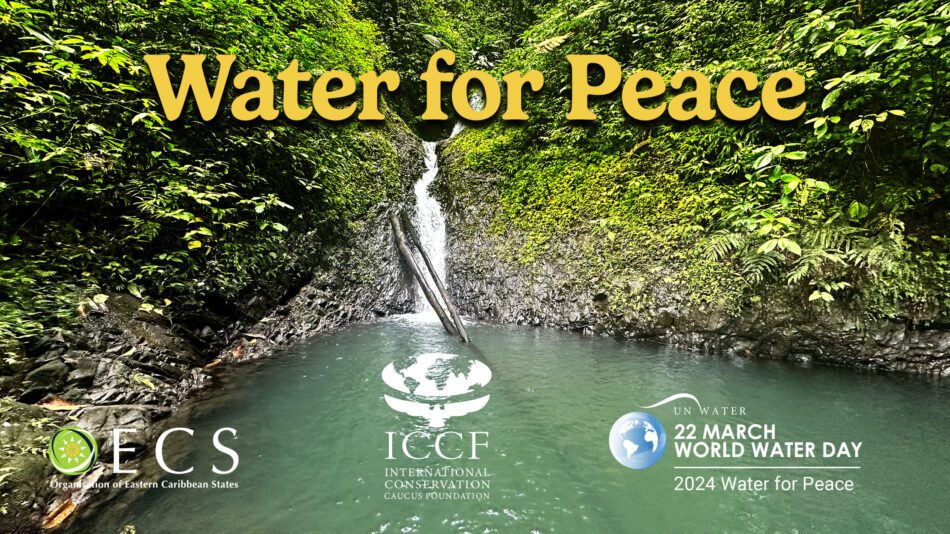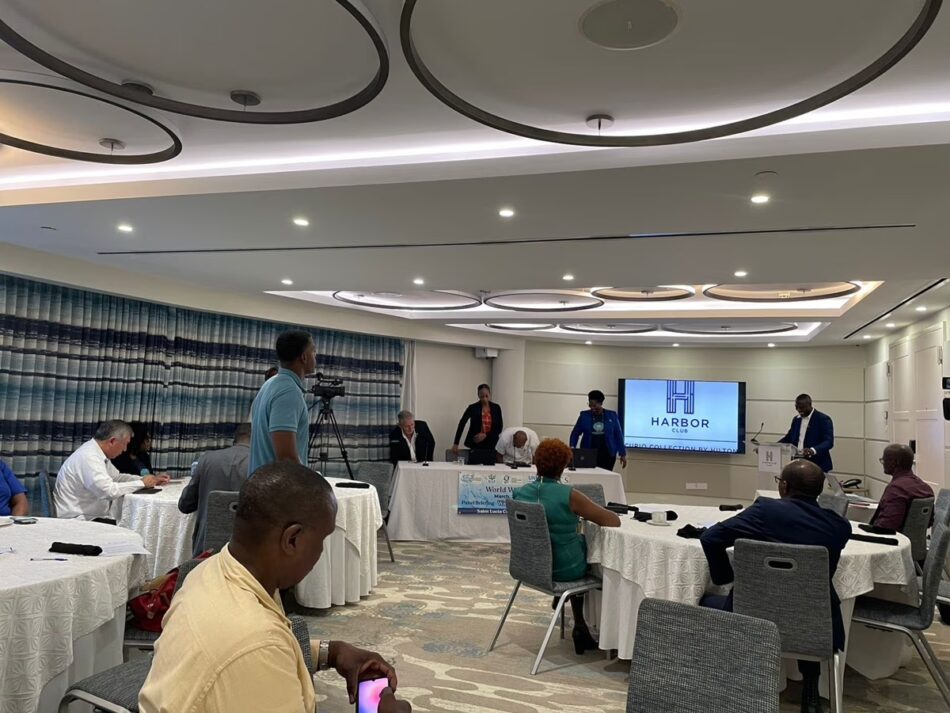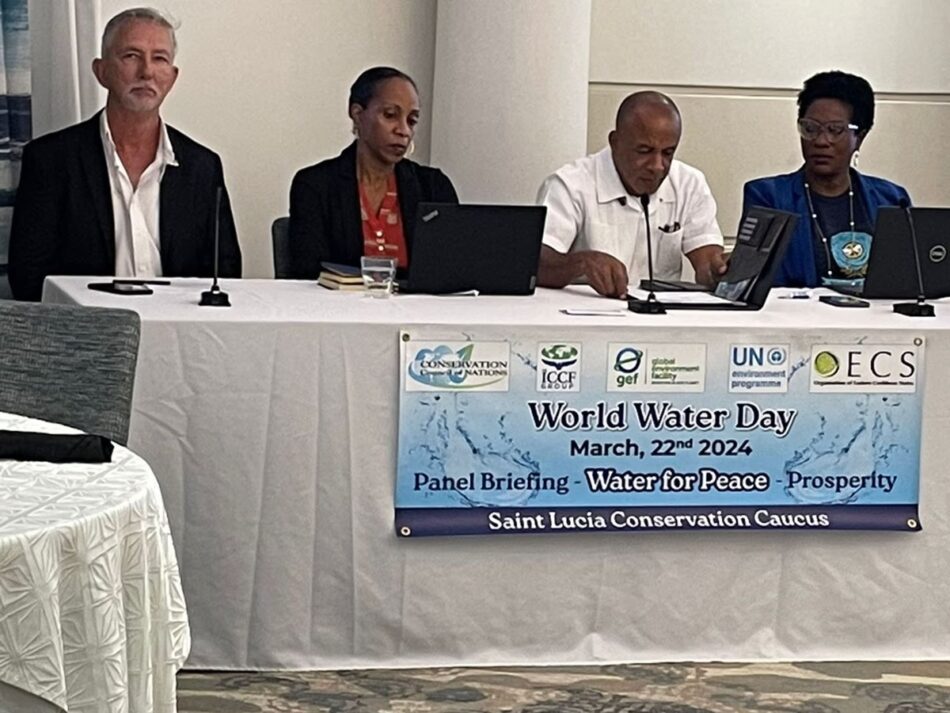The OECS and ICCF Mark World Water Day with Key Water Security Stakeholders

By Danny Moonie Communications / Knowledge Management Specialist, Organisation of Eastern Caribbean States
March 27, 2024 — The OECS Commission and the International Conservation Caucus Foundation (ICCF) on March 22, convened a caucus with critical players in Water Security in Saint Lucia with a focus on water security in the OECS as the world recognised World Water Day. The United Nations General Assembly designated March 22 as World Water Day (WWD) in 1993, adopting “Water for Peace” as this year’s theme to underscore the role of water management in fostering peace.
The meeting brought together eight senators, including opposition senator Dominic Fedee and Hon. Wayne Girard, Minister in the Ministry of Finance, Economic Development, and Youth Economy, Government of Saint Lucia. Also in attendance were the OECS Environmental Sustainability Division, Chamberlain Emmanuel, and Eustace Vitalis, Caribbean Program Officer, ICCF. Recognising the varied challenges with water supply across OECS Member States, the OECS Director General, Dr. Didacus Jules is actively engaging with regional governments to develop thoughtful policies and identify effective solutions to these pressing issues.

Although many Caribbean countries report high levels of access to municipal water supply for domestic and sanitation purposes (GWP-C, 2022), non-revenue water (NRW), which is defined as the difference between the amount of water that enters the distribution system and the amount of water billed to consumers, is well over 40% and in some cases as high as 75% (Janson, Burkhard, & Jones, 2021). Given that many countries within the Caribbean region are either water-scarce or borderline water-scarce (GWP-C, 2022), NRW requires attention. Many other factors affect water availability, including pollution, over-abstraction, and poor land management practices, all of which need to be addressed to reduce the region’s vulnerability to water scarcity.
Agriculture, tourism, and the general population of Saint Lucia are placing increasing demands on the region’s water resources. With the noticeable impacts of climate change, Saint Lucia is in danger of becoming more water-stressed if these challenges are not addressed.
The Chief Executive Officer of the Saint Lucia Water and Sewerage Authority, Zilta George-Leslie examined some of the major challenges to providing potable water on the island, including non-revenue generating water, while Carl Hunter CEO Asset Enhancement Manager, Jade Mountain and Anse Chastanet Resort, and Chair for the Saint Lucia Hotel and Tourism Association Environment Committee addressed the challenges the tourism industry faces, especially during periods of dwindling freshwater reserves. He shared how his resorts are adapting to maximise the guest experience while minimising the use of water.

Approximately 97 percent of water on the planet is salt water, found primarily in our oceans. The remaining 3 percent, which is freshwater, is locked in glaciers, ice caps and deep groundwater, and only 0.5 percent of freshwater is found in rivers, lakes and swamps. This fraction of available freshwater is unevenly distributed around the world, with dry, arid deserts in some regions, and rainforests and monsoon climates in others (Gleick, 2018). In the Caribbean, water distribution fluctuates with wet and dry seasons, and climate change further exacerbates this variability through droughts and floods. This uneven distribution, compounded by varying resource availability and infrastructure quality, can lead to community tensions, conflicts, and vandalism.
As climate change impacts become more apparent, and water demands increase, there is greater need for efforts toward water security. Water security is seen increasingly as an integral part of human security and central to the achievement of other rights such as the right to life, to education, to health, and to adequate housing (UNDP, 2006). The Global Water Partnership has defined a water-secure world as one that “integrates a concern for the intrinsic value of water together with its full range of uses for human survival and well-being” (Cashman, 2013).
United Nations officials at the High-level Forum on the Culture of Peace on September 9, 2014, highlighted that peace encompasses dignity and well-being for all, extending beyond mere conflict absence. Factors such as health, sanitation, food security, economic growth, and prosperity, all reliant on water, contribute to individual and communal dignity and welfare.
Water can also be seen as an opportunity for cooperation. Especially within Small Island Developing States within the OECS region, there is the concept of an Islands Systems Management Framework (ISM) within the Revised St. Georges Declaration of Principles for Environmental Sustainability, which recognises that, despite physical and natural resource limitations, integrated planning and management is critical if the islands are to become economically, socially and ecologically resilient. The concentration and close proximity of ecosystems on an island means that each of these ecosystems is linked to the others either through biological processes, ecological impacts, or the impacts of human interventions (OECS, 2020). All of these interlinked ecosystems are dependent on water, and conversely, clean water and flood mitigation are some outputs of ecosystem services. There is a shared need, whether at a national level across all sectors and stakeholders for each country, or at a regional level among countries, to coordinate and work together for environmental sustainability, and water security, peace and prosperity.
References
Cashman, A. (2013). Water Security and Services in the Caribbean. Technical Note No. IDB-TN-514 Environmental Safeguards Unit. Inter-American Development Bank.
Gleick, P. (2018). Water, Conflict and Peace. Open Rivers: Rethinking Water, Place & Community, no. 11.
GWP-C. (2022). Draft Action Framework for Integrated Water Resources Management for the CARICOM Region. GEF-IWEco Project.
Janson, N., Burkhard, L. N., & Jones, S. (2021). Caribbean Water Study. Water and Sanitation Division. Technical Note No. IDB-TN-2320. Inter-American Development Bank.
OECS. (2020). Revised St. Georges Declaration of Principles for Environmental Sustainability in the OECS (SGD2040).
UNDP. (2006). Human Development Report 2006. Beyond Scarcity: Power, Poverty and the Global Water Crisis. New York: Palgrave MacMillan.





